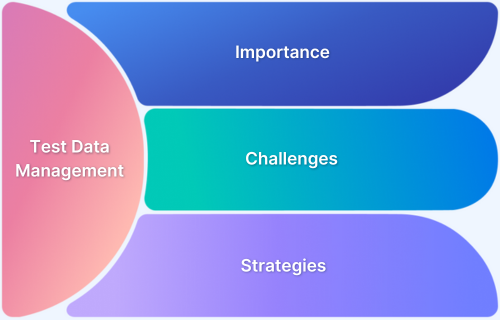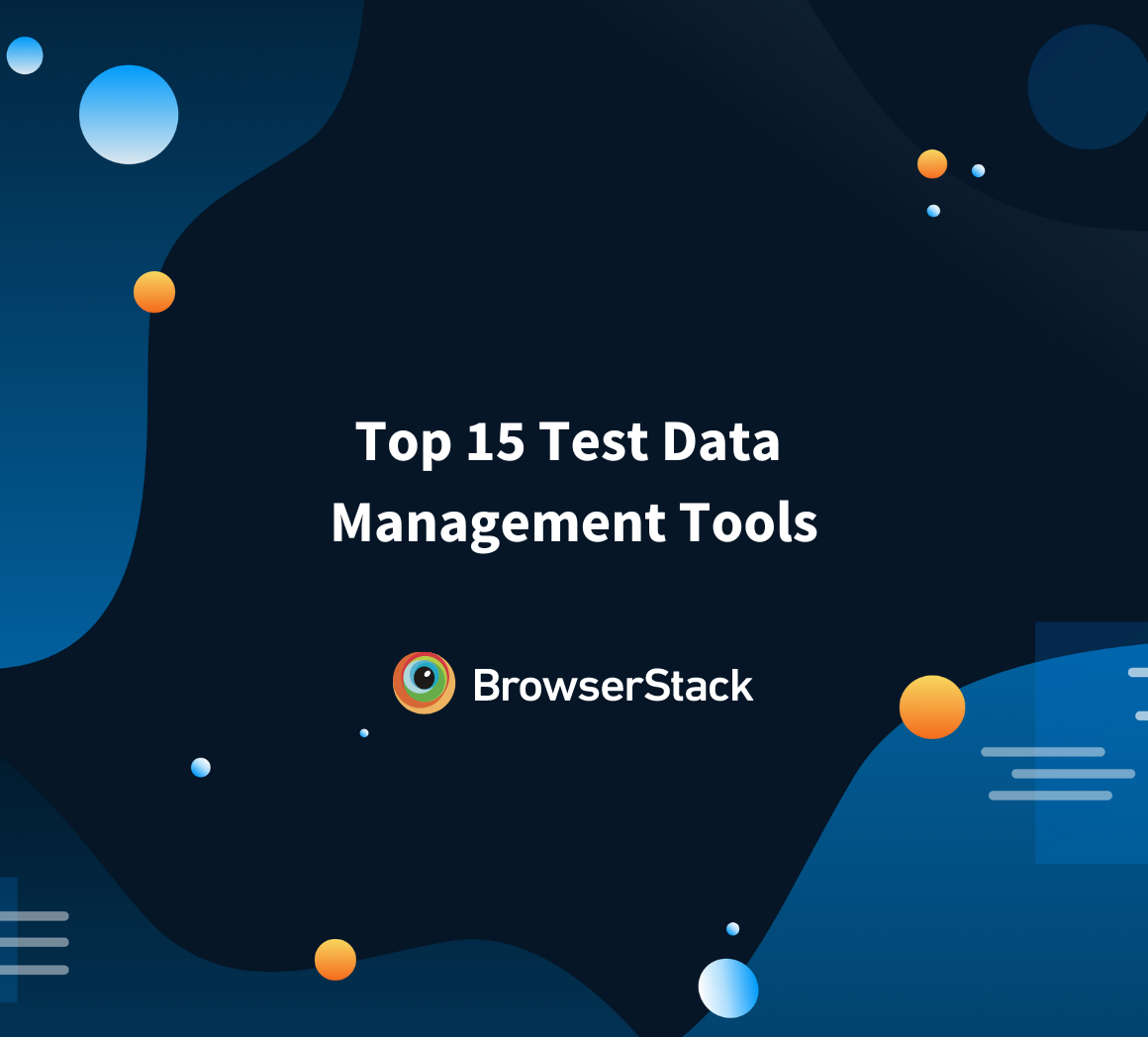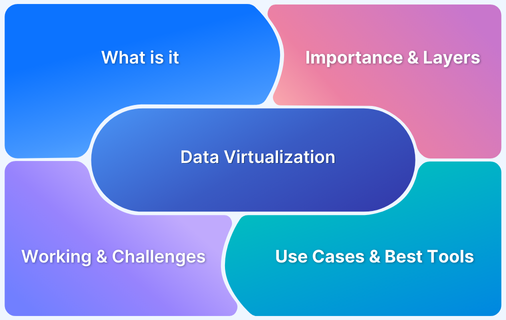Test Data Management (TDM) is the process of creating, managing, and maintaining test data to ensure accurate and efficient software testing.
Overview
Effective Test Data Management improves test accuracy and speeds up execution. It also ensures compliance with data regulations and reduces risks by providing reliable and consistent test data.
Best Test Data Management Strategies:
- Data Masking & Anonymization: Protect sensitive data by masking or anonymizing it while maintaining its usability for testing.
- Synthetic Test Data Generation: Create artificial yet realistic test data to cover various testing scenarios without using production data.
- Subset and Sampling Techniques: Reduce test execution time and storage needs by using representative subsets of production data.
- Versioning and Backup: Maintain different versions of test data and ensure backups for consistency and rollback capabilities.
- Data Refresh and Maintenance: Regularly update and clean test data to reflect the latest changes and maintain test reliability.
- Leverage Effective Tools: Use robust TDM tools to automate test data provisioning, scaling, and compliance management.
This article explores Test Data Management, its types, importance, challenges, key strategies, benefits, and how BrowserStack can enhance test data management.
What is Test Data Management?
Test Data Management (TDM) involves preparing and managing test data to ensure accuracy, security, and compliance in software testing. It includes extracting, masking, and copying data to create realistic and reliable test environments while protecting sensitive information.
The primary goals of TDM are to enhance test accuracy, ensure compliance with data privacy regulations, and reduce costs by managing data efficiently. It supports various testing stages, enabling faster development and continuous testing. TDM helps build reliable software and maintain high-quality applications by providing realistic test data.
Read More: Top 15 Test Data Management Tools
Types of Test Data
Test data is crucial for assessing software performance, functionality, and security. Different types of test data help simulate different scenarios, ensuring the system behaves as expected.
By selecting the right test data and adhering to compliance guidelines, organizations can achieve thorough, reliable, and secure software testing.
Different types of test data are used to simulate real-world scenarios, uncover defects, and ensure comprehensive software testing. Here are the key types:
- Positive Data: This includes valid inputs that meet expected conditions to verify that the system functions correctly under normal circumstances.
- Negative Data: These are invalid or unexpected inputs designed to test how the system handles errors, exceptions, and security vulnerabilities.
- Boundary Data: This data type includes values at the extreme ends of acceptable input ranges. It helps to verify that the system behaves correctly at its limits.
- Invalid Test Data: These are entirely incorrect or incompatible inputs used to assess how the system reacts to unexpected formats, data types, or values.
Why is Test Data Management Important?
Test data management ensures comprehensive test coverage, improves software quality, and minimizes the risks of defects caused by inconsistent or incomplete data. Here’s why TDM is essential:
- Ensures Accurate Testing: Reliable test data helps identify defects early, improving the accuracy of test results and reducing post-release issues.
- Supports Compliance and Security: TDM ensures sensitive data is masked or anonymized, helping organizations comply with data privacy regulations like GDPR and HIPAA.
- Enhances Test Efficiency: Well-managed test data reduces redundancy, speeds up test execution, and optimizes resource utilization.
- Facilitates Continuous Testing: TDM enables automated test data provisioning in agile and DevOps environments, supporting rapid development cycles.
- Reduces Costs and Risks: Managing test data effectively minimizes storage costs, prevents test failures due to data inconsistencies, and lowers the risk of production defects.
Read More: What is Test Management?
What Can Test Data Management Tools Do?
Test Data Management (TDM) tools help organizations create, manage, and protect test data efficiently. These tools improve testing accuracy, security, and speed. Some key features of test data management tools are:
- Protecting Sensitive Data: TDM tools mask or anonymize personal and confidential data to ensure security and compliance with laws like GDPR and HIPAA.
- Creating Smaller Data Sets: Tools extract smaller, relevant portions of large datasets to save storage and speed up testing while keeping data relationships intact.
- Generating Synthetic Data: When real data is unavailable or restricted, specialized tools generate artificial yet realistic test data to simulate various testing scenarios.
- Automating Test Data Access: Modern tools provide self-service options, allowing testers to get test data without IT help.
- Supporting DevOps & CI/CD: Many TDM tools integrate with DevOps workflows for continuous testing.
- Ensuring Compliance: Automated checks help maintain regulatory compliance with data privacy laws like HIPAA, GDPR, and CCPA.
For teams looking for a reliable and scalable test management solution, BrowserStack Test Management provides a seamless way to organize, track, and manage test data efficiently. It simplifies test case management with a centralized platform, CI/CD integration, and automated execution, ensuring efficiency and accuracy.
Best Test Data Management Strategies
Effective test data management requires structured strategies to ensure accurate, efficient, and secure testing. Implementing the right strategies helps maintain data integrity, optimize test coverage, and streamline workflows.
Here are some of the best test data management strategies:
1. Data Masking & Anonymization
Sensitive information must be protected to comply with data privacy regulations. Data masking and anonymization techniques ensure that personally identifiable information (PII) and confidential data are altered while maintaining their usability for testing. This prevents unauthorized access and minimizes security risks.
2. Synthetic Test Data Generation
When real data is unavailable, synthetic data can be generated to create realistic test scenarios. This is useful for testing new applications, performing load tests, or avoiding dependency on production data.
Synthetic data generation tools help maintain data integrity while ensuring comprehensive testing coverage.
3. Subset and Sampling Techniques
Rather than working with large, complex datasets, testers can use subsetting and sampling techniques to extract only the necessary data for a specific test case.
This improves efficiency, reduces storage costs, and speeds up test execution without compromising test accuracy.
4. Versioning and Backup
Keeping track of different versions of test data is essential for consistency and debugging. Versioning allows testers to roll back to previous datasets when needed, ensuring a stable and controlled testing environment. Regular backups help to prevent data loss and enable quick recovery when necessary.
5. Data Refresh and Maintenance
Test data should be continuously updated to reflect real-world scenarios. A good TDM strategy enables automated data refreshes, ensuring that test environments always have accurate and relevant data. This supports continuous testing and enhances test reliability.
6. Leverage Effective Tools for Scalable Test Data Management
Managing test data at scale requires robust tools that automate and streamline the process. Test Data Management (TDM) tools help in generating, masking, provisioning, and maintaining test data efficiently across multiple environments.
BrowserStack Test Management is a powerful solution that simplifies test data management by integrating seamlessly with CI/CD pipelines and automating test case execution. It provides:
- Centralized Test Data Management: Ensures all testing activities are organized and easily accessible.
- Seamless CI/CD Integration: Works with tools like Jenkins and Bamboo for continuous testing.
- Automated Test Execution: Reduces manual effort by executing test cases automatically.
- Comprehensive Reporting & Analytics: Offers insights into test performance and coverage.
Challenges in Test Data Management
While Test Data Management (TDM) is essential for efficient testing, it comes with challenges including:
- Ensuring Data Quality: Test data must be accurate, up-to-date, and relevant for reliable testing. Poor-quality data can lead to incorrect test results and software issues.
- Protecting Data Privacy and Security: Sensitive information must be safeguarded during testing while ensuring compliance with data protection laws. At the same time, realistic test scenarios need to be maintained.
- Accessing the Right Data: Testers often face delays in obtaining the necessary data from various sources, slowing down the testing process and overall development.
- Handling Large Data Volumes: As software grows more complex, the need for diverse and extensive test data increases. Managing large datasets efficiently can be challenging.
- Maintaining and Reusing Test Data: Test data can become outdated or unusable over time. Keeping it relevant and adaptable to different test cases requires continuous updates and maintenance.
Why Choose BrowserStack?
Selecting the right test data management tool is crucial for security, compliance, and efficiency. BrowserStack Test Management stands out with its comprehensive features, seamless integrations, robust security, and scalability, making it an ideal solution for modern development teams.
1. Comprehensive Features
- Automated Test Case Management: Facilitates efficient organization, execution, and tracking of tests, minimizing manual effort and errors.
- Real-time Collaboration: Enables instant team collaboration with shared dashboards and reports, enhancing feedback loops and issue resolution.
2. Seamless Integration
- CI/CD Pipeline Integration: Works smoothly with popular CI/CD tools like Jenkins, Travis CI, and CircleCI, streamlining test management within existing workflows.
- Cross-platform and Cross-browser Testing: Ensures full compatibility across different platforms and browsers with a unified testing platform.
3. Advanced Analytics and Reporting
- Detailed Reporting: Provides in-depth analytics and customizable dashboards to track key metrics, monitor testing trends, and make informed decisions.
- Error Tracking and Debugging: Helps quickly spot and fix issues, improving software quality and reliability.
4. Robust Security and Compliance
- Data Security: Implements strong security measures, including encryption and secure access controls, ensuring compliance with regulations and protection of sensitive test data.
- Audit Trails: Provides clear audit trails and logging for full transparency, helping teams stay compliant and monitor data usage.
5. Performance and Scalability
- Scalable Infrastructure: Designed to handle large datasets and concurrent tests, accommodating projects of any size.
- Optimized Performance: Efficient data processing ensures faster test execution times and reduced delays.
Conclusion
Effective test data management is crucial for ensuring accurate, efficient, and secure software testing. By implementing the right strategies and utilizing advanced tools, teams can optimize testing processes, ensure compliance, and improve software quality.
Test data management not only helps address challenges like data privacy and accessibility but also enables faster time-to-market and cost reduction.
Tools like BrowserStack Test Management simplify and enhance test data management, supporting scalable testing solutions for modern development teams. Proper test data management ensures that testing environments are reliable, secure, and aligned with real-world conditions, leading to better software outcomes.





